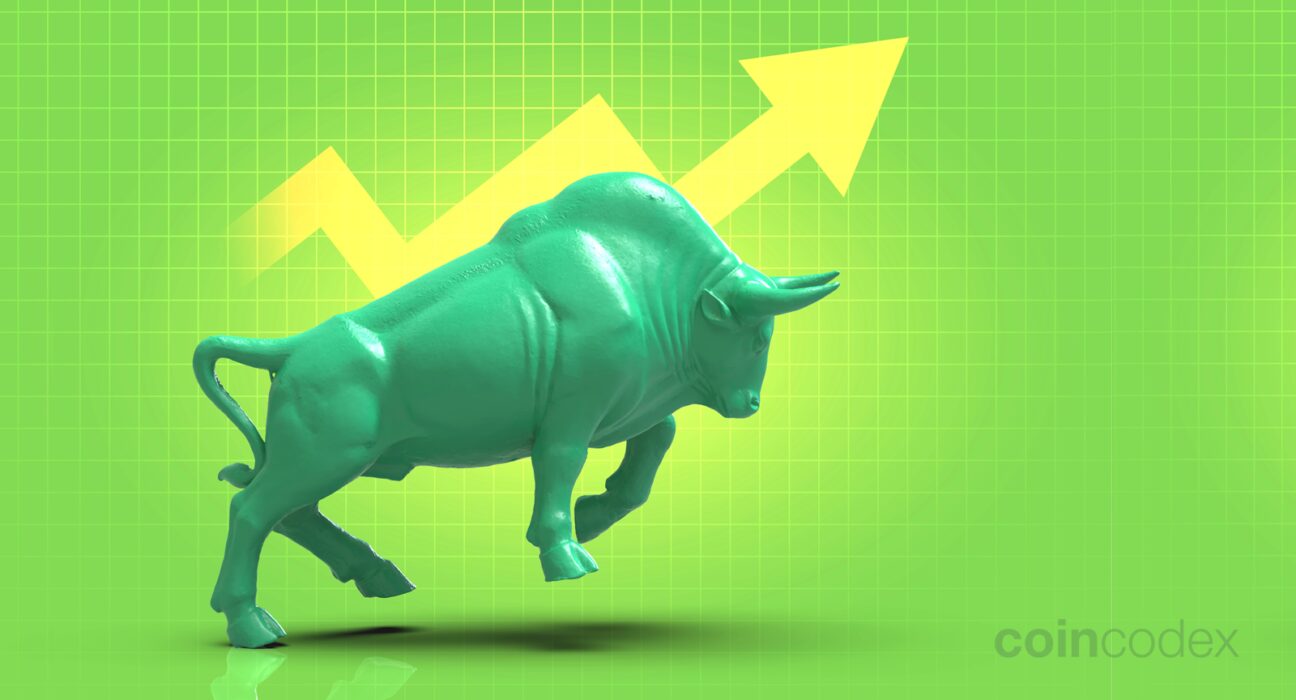Discovering bullish cryptocurrencies requires employing various strategies, such as analyzing technical indicators, staying updated on news and events, and conducting thorough fundamental research.
For beginners, knowing where to start can be challenging, given the vastness of the cryptocurrency space.
Key highlights:
- In the cryptocurrency market, being “bullish” signifies optimism about a crypto asset’s price increasing. It reflects positive sentiment and is often associated with trends that suggest potential growth.
- Technical analysis tools like RSI (Relative Strength Index), SMA (Simple Moving Averages), and trend lines are invaluable for identifying bullish patterns. These indicators provide insights into market momentum and potential price movements.
- Crypto markets are highly reactive to external factors. Staying informed through news, project updates on social media, and insights from influential figures can reveal emerging opportunities for bullish investments.
- CoinCodex provides user-friendly tools like crypto price predictions, undervalued/overbought metrics, and risk analysis, all designed to help investors make data-driven decisions and spot promising assets.
In this article, we’ll explore effective strategies for identifying bullish crypto and demonstrate how CoinCodex’s suite of tools can help you uncover potential investment opportunities.
What does bullish mean in crypto?
In the context of cryptocurrency, the term “bullish” refers to a positive sentiment or outlook on the future price or market trend of a particular cryptocurrency or the entire crypto market. A person or investor who is bullish believes that the price of the cryptocurrency will increase in the future and, therefore, may consider buying or holding onto the cryptocurrency in question.
The term is often used to describe a positive market sentiment and can be contrasted with the term “bearish,” which indicates a negative sentiment or outlook.
6 strategies to find bullish crypto
The most commonly used approach to find bullish crypto is to use a combination of different methods, including technical and fundamental analysis, following news and influential individuals on social media, and assessing a crypto’s potential based on its market capitalization.
We are going to examine each of these strategies in more detail in the following sections.
Analyze technical indicators
Technical analysis involves studying past market data, such as price and volume, to identify patterns and trends. By looking at technical indicators such as moving averages, relative strength index (RSI), and stochastic oscillators, you can get an idea of the current market sentiment and identify bullish cryptocurrencies.
You can find charts with RSI, 50-Day SMA, and 200-Day SMA projections for virtually every cryptocurrency on CoinCodex.
Here’s a brief explanation of some of the most popular technical indicators used to analyze cryptocurrencies:
Relative Strength Index (RSI)
RSI is used in investing and trading to measure the strength of a security or crypto asset’s price action. RSI is a momentum oscillator that compares the magnitude of recent gains to recent losses in order to determine overbought and oversold conditions. The RSI is calculated using a formula that takes into account the average gain and loss over a specified period of time (usually 14 days).
When the RSI is above 70, it may signal that the crypto is overbought and due for a price correction or reversal, and traders may consider selling. Conversely, when the RSI is below 30, it may signal that the crypto is oversold and due for a price bounce or reversal, and traders may consider buying. In other words, a crypto with an RSI of less than 30 could become the next crypto to explode.
Simple Moving Average (SMA)
SMA is another widely used technical indicator, calculated by taking the average price of a crypto asset over a specified period of time, such as 20, 50, or 200 days. The SMA is a lagging indicator, meaning that it is based on past price data and provides information about the crypto’s trend over a specified period of time.
When the price of a cryptocurrency is above its SMA, it is generally considered to be in an uptrend, while a price below its SMA may indicate a downtrend. In addition, when the price crosses above its SMA, it may signal a bullish trend reversal, while a price crossing below its SMA may signal a bearish trend reversal.
Additionally, if a 50-day moving average crosses above the 200-day moving average, that may often indicate a bullish trend as well. Similarly, if the 50-day moving average crosses below the 200-day moving average, that may indicate a bearish trend.
Trend lines
While trend lines are more commonly used in forex trading, they can be a helpful tool in determining whether a crypto is bullish or not. For example, an upward trend line, as the name suggests, means the price is likely going to continue rising, while a downward trend line means the price will likely continue to fall. Sideways trend lines mean the price is not trending in any particular direction, but they can help traders identify potential support and resistance levels. These are especially useful if you use the candlestick charts instead of simple line graphs, as then you can pair them with our candlestick patterns cheat sheet for even greater accuracy.
Monitor news and events
Cryptocurrencies are influenced by news and events, such as new partnerships, regulatory changes, and major announcements. By keeping up-to-date with the latest news and events, you can identify potential bullish cryptocurrencies.
You can find all the latest news updates and developments under each coin’s news feed on CoinCodex, including Bitcoin and all the other coins and tokens. Additionally, subscribing to crypto newsletters (such as our own) can be a great way to stay on top of the latest developments via bite-sized emails.
Look at market capitalization
Market capitalization refers to the total value of a cryptocurrency. Cryptocurrencies with a high market cap are generally considered to be more stable and have a better chance of being bullish in the long run.
However, a high market capitalization also means that sudden and large bullish moves are less likely—for example, it is far easier for a project with a market cap of $10 million to double in value as it is for a project that’s worth $1 billion.
Follow influential people
Following the top people in crypto, such as developers, traders, and investors, can give you valuable insights into which cryptocurrencies are likely to be bullish based on the latest developments. For instance, Elon Musk’s X posts often have a significant impact on the price of DOGE, illustrating how prominent individuals can shape market trends and drive investor sentiment.
It is also a good idea to follow the social media channels of the projects you might be interested in, as they usually feature their roadmap goals, upcoming events and goals, and more. This can give you plenty of insight into how well the project might perform in the future.
On-Chain analysis
Metrics like the number of active wallet addresses, transaction volume, exchange inflow and outflow, and TVL just to name a few are all potential indicators of bullish trends. In addition, crypto whale trackers are a great way to monitor the so-called crypto whales, as whale transactions can also signal bullish/bearish trends.
Conduct fundamental analysis
Fundamental analysis involves evaluating the underlying factors that drive the value of a cryptocurrency, such as its technology, team, and adoption rate. By conducting fundamental analysis, you can identify potential bullish cryptocurrencies based on their long-term prospects.
It is worth noting that fundamental analysis might not be as important for smaller market cap currencies, as they are often subjected to market trends established by the largest cryptocurrency projects.
Find bullish crypto with CoinCodex’s market tools
There are several tools available on CoinCodex that are designed to be user-friendly and allow users to find digital assets that could offer lucrative investment opportunities.
Crypto price predictions
Accounting for past historical price movements and technical indicators, you can check up to year-long crypto price predictions on the CoinCodex page.
Our Bitcoin price prediction page offers many insights into BTC’s potential future trends.
In addition to price prediction charts, you can check the state of each individual technical indicator. That can be especially useful for users who are a bit more advanced and know how different indicators interact with each other.
For those who are not as experienced with reading individual indicators, you can quickly see the state of indicators and how much of them are signaling bullish movements versus how many are signaling bearish activity.
You can check the current investment sentiment of each crypto listed on CoinCodex calculated using more than 30 technical indicators.
Find undervalued cryptocurrencies
As we discussed earlier in this article, RSI can offer a glimpse into the current market state of a particular cryptocurrency – an RSI over 70 may signal that a crypto is overbought, while an RSI below 30 might mean that a crypto is undervalued.
Using these metrics, you can quickly deduct what is happening with a cryptocurrency and how it might be performing in the future. Obviously, RSI is not the only indicator that’s worth following, but it is one of the most widely used ones, both in crypto and traditional markets.
Top undervalued/overbought cryptos.
Check highlights and risk analysis
Another piece of data that can prove very useful when searching for bullish cryptos, is the highlight and risk analysis section that is available for every coin and token on CoinCodex.
The section provides dozens different pieces of market and price action information that can be very useful when analyzing a particular cryptocurrency, but you don’t have time to dive deep into the ins and outs of various indicators, historical price activity, and other analysis methods.
The highlights and risk analysis section provides the most important information about a particular coin in a way that’s beginner friendly. The above section shows data for Bitcoin.
The bottom line: There are different ways of finding bullish crypto
There are various ways of finding bullish cryptos. However, we believe that the approach outlined in this article is a good starting point and can be of great benefit when investing in crypto.
Still, using the strategies and tools presented in this article can be time-consuming. For those that lack time to do extensive research themselves, we offer a highly curated and weekly-updated best crypto to buy article, which includes a combination of established and up-and-coming crypto projects that we believe are worth investing in.








